Using data to determine if Die Hard is a Christmas movie

Ok, enough bickering and fighting.
Let's settle this once and for all in the only way I know how - going into a topic in way too much detail. As we prepare to enter the year 32 ADH (a.k.a. After Die Hard), the world is gripped by a constantly nagging question.
No, it's not "Why does everyone call Hans Gruber and his gang 'terrorists' when they were clearly bank robbers?"
Today we're going to use data to answer the question "Is Die Hard a Christmas movie?" Along the way, we're going to test Die Hard's Christmas bona fides against all movies in US cinemas for the past thirty years, using a variety of methods.
What is Die Hard?

Die Hard is an action thriller from 1988 in which a grizzled NYPD cop becomes a one-man army to take on a group of German bank robbers who are holding his wife and her unlucky colleagues hostage in a high-rise office block.
The film takes place at Christmas time but Santa is nowhere to be seen (or was deep undercover - the movie doesn't make that clear). The movie's plot came from the novel Nothing Lasts Forever by Roderick Thorp, which was a follow up to The Detective. There was a 1968 movie adaptation of The Detective starring Frank Sinatra and so, contractually, a then 73-year-old Sinatra had to be first to be offered the role of action hero John McClane. Fortunately for us, he turned it down and our dirty-vested protagonist was instead played by Bruce Willis.
The movie has been a hit with critics and audiences for just over three decades and it often appears high on lists of top action movies.
In recent years, there has been growing debate as to whether Die Hard should also be included in the pantheon of great Christmas movies and it's this question which we will settle today.
What is a Christmas movie?
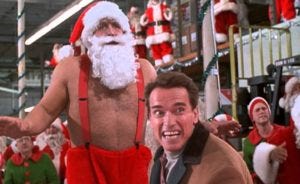
Some Christmas movies are obvious - Jingle All the Way is hands-down a (bad) Christmas movie.
Some movies are obviously not Christmas movies - Last Action Hero is just a bad movie.
The reason Die Hard sparks such fierce arguments is that film appreciation is subjective. Filmmaking is a highly collaborative art without one single ‘creator’ and films are typically designed to be seen by large numbers of people around the world. We are all aware that we have differing preferences but few people consider that we also have differing perspectives on what a ‘movie’ actually is.
I contend that there are three distinct perspectives through which we can consider a movie:
Creative. By seeing the film as an artistic work, we can parse the intent of the filmmakers and limit our enquires to what we see and hear while watching it.
Commercial. We could focus on the film as a commercial product, made to fuel a capitalist industry which is propelled by marketing and responds to customer demands.
Cultural. We could put aside the story within the movie (i.e. the plot) and focus on the story OF the movie. This means considering what a movie means to people, how it is regarded and how it fits in the wider discourse of movies and of culture more broadly.
I have gathered data for each of these perspectives to see what we can discover about the essence of Die Hard’s Christmasness (or its Christmaslessness, as remains to be seen).
Part 1 - Creative
Let’s start by assessing the artistic work of Die Hard (as opposed to the commercial product or cultural icon).
We'll do this by measuring the Christmas references in the script, on-screen and in the soundtrack.

The script
By going back to the film's script we are able to see what the screenwriters saw as part of their vision. The word "Christmas" appears 18 times in the script, which is more than the words "explode" (4), "die" (5),"hard" (11), "shoot" (12), "kill" (13) and "blood" (13), although far fewer times than"gun" (73), "terrorist" (51) and "suddenly" (45).
The script also includes a rather meta reference to whether a song (RUN-DMC's Christmas in Hollis) is Christmassy enough.
Creators' intent
One of the two credited writers of the film, Steven de Souza has publicly declared “If ‘Die Hard’ is not a Christmas movie, then ‘White Christmas’ is not a Christmas movie”. He pointed out that, unlike White Christmas, his movie took place entirely at Christmas, featured a Christmas party and the "Christ-like sacrifice" of John McClane walking on broken glass.
However, Bruce Willis is firmly in the "No" camp. He told the Hollywood Reporter: "Die Hard is not a Christmas movie! It's a goddamn Bruce Willis movie!"
Visual references
There are a total of 21 distinct Christmassy elements in the movie, ranging from Santa hats and Christmas Trees to festive treats and a pivotal piece of "Christmas Greetings" tape.
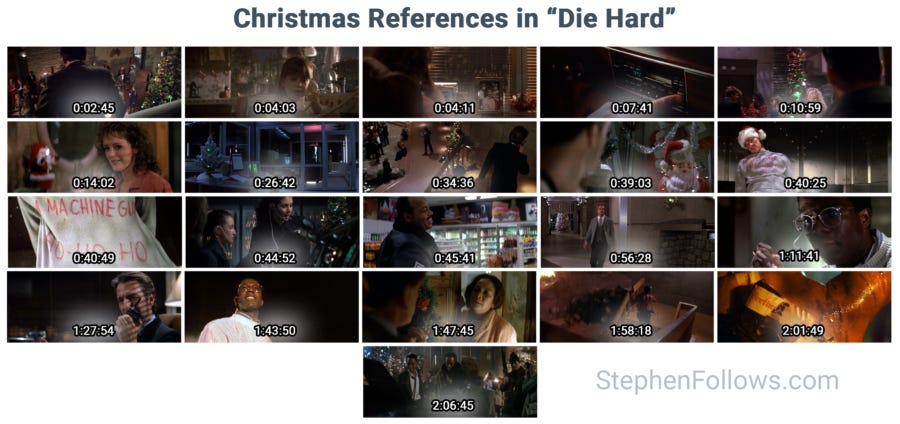
Sadly, I can’t do detailed visual analysis on every movie released over the past thirty years as they would take 1,356,242 hours to watch - or until 6th Sept 2173 if I watch them back to back, which my wife says I'm not allowed to do.
All this means that, so far, we are only able to say that Die Hard "contains some Christmassy elements" but not how it compares to other films.
I have found other movies which are not generally regarded as Christmas movies but which could pass this test - e.g. In Bruges, Trading Places and About A Boy are all set at Christmas time. And non-Christmassy movies with more uses of the word "Christmas" in their scripts than Die Hard include The Apartment (31), L.A. Confidential (24) and Annie Hall (19).
Audible references
Let's turn to a cultural measure of Christmasification for which we can get large-scale data: songs. I gathered song listings for three-quarters of all movies released over the past thirty years and identified the songs culturally associated with Christmas. Of these films, 95.5% did not feature any Christmas songs at all. Shame.

The prevalence of Christmas songs in modern movies varies considerably but in most years it ends up that between 3% and 7% of movies have at least one such ditty. This means that having even one Christmas song makes a film unusually Christmassy compared to most other releases.
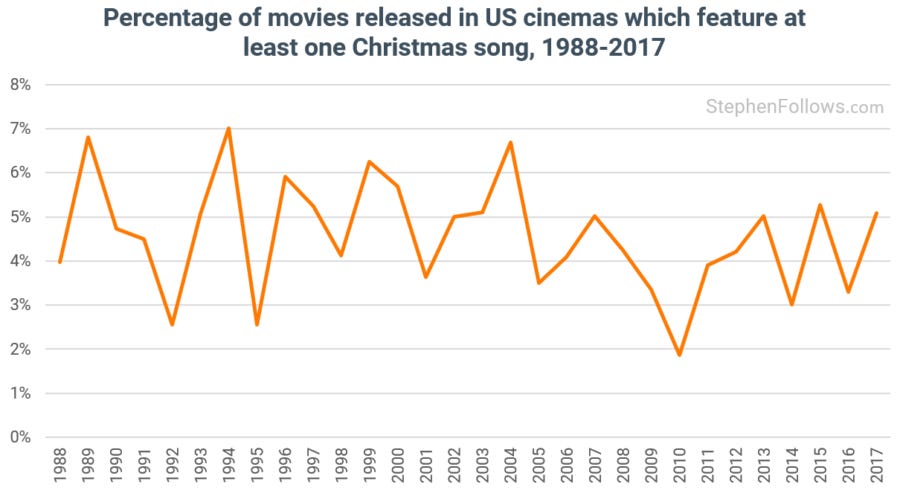
The most widely used Christmas song is Jingle Bells, followed by Deck the Halls and Joy to the World.

Note: Jingle Bells wasn’t actually written as a Christmas song but was intended to be about Thanksgiving. Not only is this a bit of trivia to bore your family with over Christmas dinner, but it also sets the stage for our third perspective which looks how artistic products are perceived over time, no matter their creators’ initial intent. More on that later.
Die Hard features Christmas in Hollis, Winter Wonderland, a whistled section of Jingle Bells and a rousing rendition of Let It Snow over the end credits. This means that audibly, Die Hard is more Christmassy than 99.2% of all movies released over the past thirty years.
To conclude this first perspective, it could be argued that Die Hard is a Christmas movie from the point of view of what's creatively in the movie but it's far from being a slam dunk case. Plus, there are other movies which would pass some of these tests despite being less Chritsmassy overall.
Part 2 - Commercial
Let’s move on to the commercial side of the movie. This takes us far away from the piece as an artistic work and sees it as a product in the audio-visual distribution machine that is Hollywood. We'll look at the choices made by the film's studio, 20th Century Fox, to learn how they viewed the movie at the time of release.
Release dates
A movie’s release date can reveal a lot about how the studio or distributor views the movie. In the past, I have looked at how the annual release calendar contains the same repeating patterns each year and no-one will be surprised to hear that Christmas movies tend to come out around, well, Christmas.
In order to decode the release date, let’s look at the US release dates of movies we are absolutely certain are Christmas movies - those with Christmas-related terms in their title (such as A Bad Moms Christmas, Christmas with the Kranks and Bad Santa).
Over half of such movies were released in November and a further 30% opened in December. 40% of these Christmas movies opened between five, six or seven weeks before Xmas day.

By contrast, Die Hard opened in the US in July 1988 and in the UK in February the following year - distinctly un-Christmassy months.
Poster
Next, we turn to how the movie was marketed to moviegoers. Across all 13,255 movies, only 0.5% have explicitly Christmassy imagery on their main poster (i.e. the posters used on IMDb and Wikipedia). The most common elements are Santa suits, wrapped presents and Christmas trees with red and green colours taking precedence.

Some movie posters make vague references to the season, such as snow or frosted windows, but I did not include these as being Christmassy because otherwise we're not being serious about this and we might as well include Touching The Void.
None of Die Hard's contemporaneous theatrical posters featured any Christmas elements, instead sticking to explosions, guns and a big picture of Bruce Willis' worried-looking face. However, it's worth noting that some extremely Christmassy movies do not use Christmas imagery on their posters, such as The Nightmare Before Christmas, The Holiday and Home Alone.
Tagline
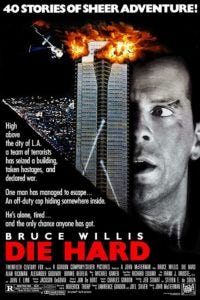
The posters for Die Hard used a mix of taglines, including;
Twelve terrorists. One cop. The odds are against John McClane... That's just the way he likes it.
High above the city of L.A. a team of terrorists has seized a building, taken hostages and declared war. One man has managed to escape. An off-duty cop hiding somewhere inside. He's alone, tired... and the only chance anyone has got.
40 stories of sheer adventure!
Not a Christmas reference in sight. Whereas most true Christmas movies highlight how important the holiday season or festivities are to the plot:
Krampus - You better watch out.
Elf - This holiday, discover your inner elf.
The Polar Express - This holiday season... believe.
The Escape Clause - 'Twas the fight before Christmas.
National Lampoon's Christmas Vacation - Yule crack up.
Home Alone - When the McCallisters went on holiday they forgot one minor detail... Kevin
To conclude the commercial perspective, it's abundantly clear that 20th Century Fox did not see Die Hard as a Christmas film.
Part 3 - Cultural
Finally, we turn to the last of our three perspectives - viewing the film as a cultural icon, above and beyond the movie or its commercial impact. We will measure this by looking at how many people regard Die Hard as a Christmas movie, when people think about Die Hard and how this is shifting over time.
IMDb user lists
IMDb allows registered users to make public or private lists of films. I found 2,007 public lists which directly purported to contain Christmas movies, such as The Top 100 Christmas movies of all-time, Christmas Movies and 100 Movies set in winter time: Christmas time.
By gathering all of the movies in these lists, we have a dataset of 1,320 feature films which people are happy to publicly describe as Christmassy. Not only that, but we can see which are the most frequently cited.

Die Hard is the 22nd most frequently cited movie of all time in Christmas-themed IMDb lists.
Wikipedia page views
If a movie truly is "a Christmas movie" then we would expect to see a significant increase in interest in the movie around the Christmas period. To see if this is the case for Die Hard, I have gathered Wikipedia pageview data from the past three and a half years for two sets of movies - top action movies and top Christmas movies. This will show us what kinds of patterns we should be looking out for when we turn to Die Hard's pageview data.
Interest in action movies does not fit an annual pattern - views are spread fairly evenly through the year.

Conversely, page views for Christmas movies spike... well, exactly where you'd expect them to - in December.

Let's look at Die Hard's page views and see which of these two patterns best matches our film du jour.
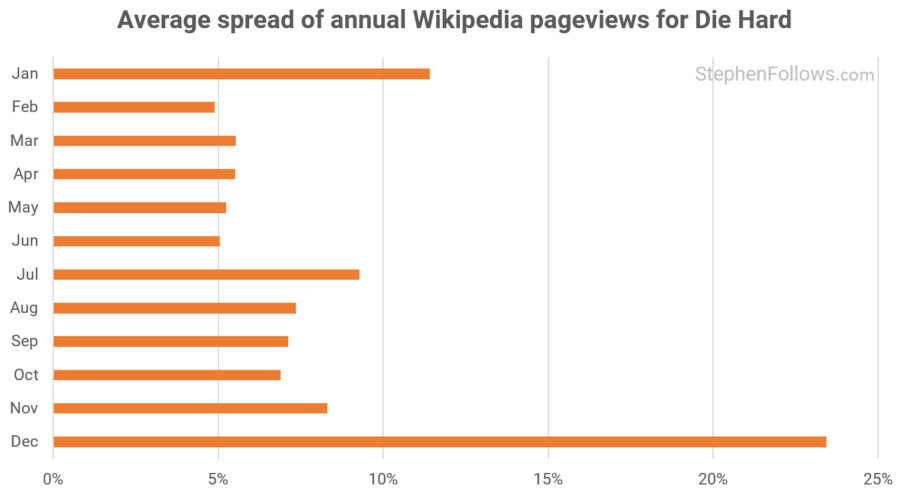
While not as pronounced as the other Christmas movies, it's clear that public interest in Die Hard spikes in December.
Google Trends
Finally, let's look at how public interest in Die Hard changes over a longer period of time. Google Trends allows us to do just that and the chart below shows the results for the term “Die Hard”. The releases of Die Hard 4.0 and A Good Day To Die Hard are the two busiest non-Xmas periods for “Die Hard” references. Once we discount these Die Hard sequels, we can see a clear trend of the phrase being used around Christmas time.
Fifteen years ago, there was little to no cultural link between Die Hard and Xmas. This started to change in the early 2010's and by the end of the decade was firmly entrenched.

The final result: Is Die Hard a Christmas movie?

After taking this long journey with me, I’m sure you can appreciate the complexity involved in answering a seemingly simple question. We’ve had to consider what is a movie, who is asking the question (plus who is answering it) and how the perception of movies change over time.
So, is Die Hard a Christmas movie? The neatest summary I can provide is... It may or may not have been, but it most certainly is now.
Although the studio did not intend it to be a Christmas movie, some of the film's key creators did. Either way, it’s certainly fair to say that Die Hard is regarded as a Christmas movie in popular culture. Like it or not, the association between Die Hard and Christmas is fast increasing and in years to come its Christmassyness will be beyond question.
Future generations will read in wonder that Die Hard was ever thought not to be a Christmas movie and articles such as the one you’re reading now will be seen as nothing but a massive waste of everyone’s time. Imagine that!
Notes

Data for today's research came from IMDb, Box Office Mojo, The Numbers / Opus and Wikipedia.
Unless otherwise stated, all data relates to the initial US theatrical release of the movies in question. Wikipedia data relates to the period 1st July 2015 and 14th December 2018.
For each dataset created and used in this research, I have tried to be as complete and thorough as possible. It’s never going to be possible to be 100% comprehensive as much of this work relies on the accuracy of public sources of data. If a Christmas song is featured in a movie but not listed as such on any public movie database then I too would have overlooked it.
There were a few threads I did not have time to explore. A major one is an uptick in screenings of Die Hard, both on television and in cinemas, over the Christmas holiday period. I also could have used my data more broadly, to look at other Christmas movies. This could be a future article if there’s interest.
There were also a few threads I chose not to follow. For example, some people suggested the number and volume of Christmas-themed merchandise around a movie should be taken into account. Given the rampant capitalist world we live in, I don't think this is a reliable metric of anything other than the lengths companies will go to sell us rubbish at Christmas. Game of Thrones is not Christmas-related in any way but you can buy Ho Ho Hodor Christmas jumpers, Jon Snow Christmas tree decorations and 'Christmas is Coming Jon Snowman' mug.
I’m very grateful to all of my readers who responded to a call asking for tips on what to track, to the students at Birmingham City University for their ideas last week and to Liora for helping with research and structuring the piece.
Epilogue
If you have a question or objection to any of my methods, please either leave a comment below or drop me a line privately.
If you would like to complain about the result and demand a second referendum then... well, tough. This is the only deal on offer. Ho-ho-ho.
P.S. If you want to hear me chat about the topic you may enjoy this episode of Indie Film Hustle podcast with Alex Ferrari.


